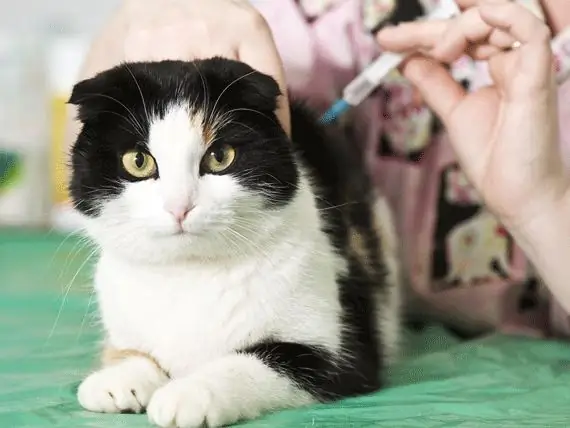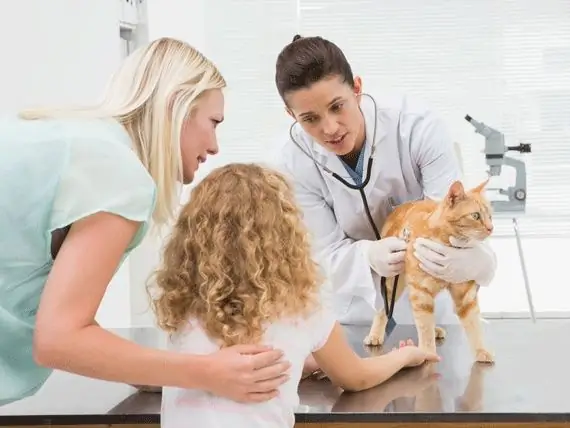
- Författare Daisy Haig haig@petsoundness.com.
- Public 2023-12-17 03:14.
- Senast ändrad 2025-06-01 06:48.
Så vad är det pinsamma caca-testet för, hur som helst?
Det är tillräckligt stressande att ditt husdjurs baksida kränks av en plaststav, eller hur? Så vad är poängen?
Du säger: Om målet är att göra mitt husdjur friskare och parasitfritt kommer jag att lita på din bedömning, men jag måste säga att avföringskontroll är en slags grym och ovanlig sorts bestraffning. Jag får inte den typen av förnedring förrän jag är manlig och fyrtio, eller hur? Och avföring är inte så bra, eller hur?
Jag säger: Till att börja med behöver du inte ha ditt husdjur att ge efter för den olyckliga staven. Ett nytt prov erhålls vanligtvis lätt på morgonen (eller eftermiddagen) före ditt årliga besök eller när som helst ditt husdjur lider av gastrointestinala symptom. Det är egentligen inte så tufft. Och om tidpunkten inte är exakt rätt (avföring bör inte vara äldre än en timme för bästa resultat) kommer ditt veterinärsjukhus säkert inte att neka dig rätten att ta in ett superfriskt prov när det passar dig. Löfte.
Och ja, fekal undersökningar, men relativt billiga och rutinmässiga, är oumbärliga. Men som det här inlägget kommer att visa är det också sant att inte alla fekala tester tar upp en parasitinfektion hos dina husdjur. Det är därför som årliga och / eller seriella fekala undersökningar kan vara nödvändiga.
Nu för det primära målet för testet:
Veterinärer är alltid på jakt efter parasiter som kan komma in i dina husdjurs mag-tarmkanaler. Visst, vi människor kan också få parasiter, men våra moderna livsstilar tenderar att vara mindre gynnsamma för parasitinfektion. (När sista gången du snusade i trädgården, läppar till marken, bara så att du kunde andas in en kattkyrka eller två?)
Ja, husdjur får massor av parasiter. Här är ett urval av de vanligaste gastrointestinala parasiterna jag ser här [i parasithimmelen som är semitropiskt i södra Florida]:
Rundmaskar hos hundar och katter.
Hakmaskar hos husdjur
Piskmaskar hos husdjur
Giardia hos husdjur

Leverfluk hos husdjur
Leverfluk hos husdjur
coccidia in pets
i’ll not go into the gory details on each but you can click on the links and check out the info for a better understanding of how these parasites can potentially affect your pets and even your human family.
sure, pet-popular parasites don’t often infect humans in the so-called, “developed” nations all of you reading this likely live in, but that doesn’t mean it doesn’t happen. roundworms and hookworms are still a factor in humans in the us, as is giardia, which will give you the nastiest case of diarrhea you can imagine short of amoebic dysentery.
since veterinarians are also on the front lines when it comes to public health, consider that fecal exams are not just necessary for healthy pets, they’re essential for healthy humans, too, more so if your family members are very young children, very old adults or otherwise immunocompromised (transplant patients, hiv-positive humans, chemo recipients, etc.).
how do we identify these critters in the fecal exam?
the short answer: with a microscope.
the long answer: we take a tiny sample of your pet’s stool (very fresh is always best). a few grams is enough (think an eighth of a teaspoon if that’s easier). then we put it through one of three processes.
1. the smear: we take about a half gram of stool and smear it onto a microscope slide to search for parasites (and bacteria) directly. many times we’ll see them swimming about. finding evidence of parasites in a simple smear is often indicative of severe infection.
2. the float: this method relies on mixing the stool with a special solution. it filters out the big pieces of stool in a tube or other cylindrical vessel and allows the eggs and other small critters to float up to the top, buoyed by the solution’s specific gravity. a microscope slide’s cover slip is typically used to recover the floaters. some parasites, however, aren’t amenable to flotation. eggs seem to do best through this method.
3. centrifugation: spinning the heck out of stool in a centrifuge when it’s mixed in a sugar solution picks up about 50% more parasite eggs and oocysts than through flotation. therefore, i like this method best for worm eggs, giardia, and coccidia--though i’d never go without a smear. problem is, most hospitals don’t yet use this method. it’s more expensive than others and research demonstrating it’s much greater efficacy is fairly recent.
so now you know the truth: not all fecal exams are created equal. not only does this test rely on careful selection of materials and methods, it also requires a trained eye. in our practice, for example, one of our techs detects parasites about 50% more often than the veterinarians and other techs/assistants. (that’s why we also do floats so that she can check them all at her convenience when she comes back from her day off.)
it’s also true that even a parasite-infected animal will often not come up positive on a fecal test. human error and equipment choice are factors, but so is the parasite itself. sometimes they do not make themselves known in the stool. worms sometimes aren’t shedding their eggs and subclinical (low-grade or smoldering) infections may not reveal much, either.
again, that’s why it’s important to perform this test as often as is reasonable. for all dogs and cats at least three times during the first few months of life. i want to see at least two negative tests in a row, a month apart, before i’ll feel comfortable that my patient is parasite-free.
for adults, once a year is great--that is, unless they show gastrointestinal illnesses. in this case, serial fecal tests make sense--or at least one every time the symptoms recur until a definitive diagnosis is made (whether it’s parasites or something else).
ultimately, fecal tests are a critical component of our veterinary hat of tricks. doing without may seem like the economically wisest thing in the absence of gastrointestinal symptoms, but consider: parasites can wear pets down in ways you might not expect. and it’s never wrong to be too safe in the presence of diseases that may also affect your family. ‘nuff said.
Rekommenderad:
6 Saker I Ditt Hus Som Kan Utlösa Ditt Husdjurs Allergier

Husdjursallergier kan vara en svår fråga att hantera, särskilt när du inte kan ta reda på vad som orsakar dem. Ta reda på vilka sex saker i ditt hem som faktiskt kan vara roten till ditt husdjurs allergier
Hur Man Lär En Hund Att Komma Till Dig I Vilken Miljö Som Helst

Lär dig hur man lär en hund att komma i vilken miljö som helst
Vad Blodarbete Berättar För Din Veterinär Om Ditt Husdjurs Hälsa

Blodarbete utförs för att säkerställa att vi är lika friska på insidan som vi ser ut på utsidan eller för att övervaka tidigare diagnostiserade medicinska tillstånd. Detsamma gäller sällskapsdjur. Lär dig mer om vad blodarbete kan berätta för din veterinär
Vad Du Behöver För Att Fråga Din Veterinär Om Ditt Husdjurs Cancer

Ägare ställer en enorm mängd frågor om sina husdjurs cancer. Vissa är förutsägbara och andra är mer specifika, medan andra kan vara anmärkningsvärt sonderande. Läs mer om vad du bör fråga din veterinär
Djursjukhusapotek: Förstå Vad Som Finns I Ditt Husdjurs Medicin

Nya mediciner görs ständigt tillgängliga för våra husdjur för att förbättra säkerheten och effekten av veterinärmedicin. Men vet du verkligen vad som händer på djursjukhusets apotek?
